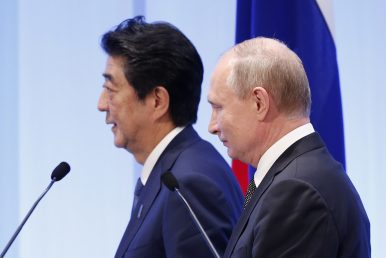By Michito Tsuruoka
One of the major features of Japan’s foreign policy under Prime Minister Shinzo Abe since he returned to power at the end of 2012 has been his commitment to improving relations with Russia. Abe’s primary goal is to conclude a peace treaty with Moscow, which for Tokyo means solving the Northern Territories issue: the return to Japan of the four islands occupied by the Soviet Union and post-Soviet Russia after World War II. Resolving the territorial issue with Russia is one of the major remaining challenges for postwar Japanese diplomacy, alongside the normalization of Japan’s diplomatic relations with North Korea, and Abe is hardly the first leader to tackle it.
At one point, there was a surge in optimism in Tokyo that the Northern Territories might actually be returned to Japan under Abe, even if only in part. That expectation has since receded significantly. Many experts, including this author, do not believe that the islands will be returned any time soon and unsurprisingly many observers both in Japan and overseas question Abe’s continued overtures to Moscow. Still, there are four reasons why the Abe administration’s policy toward Russia remains viable, regardless of whether or not the islands are to be returned to Japan.
First, in view of the strategic landscape in Northeast Asia, it is always in Japan’s interest to establish good working relations with Russia, a resident strategic player in the region. Having confrontational relations with China and Russia simultaneously and allowing them to gang up against Japan is arguably Tokyo’s biggest strategic nightmare. Assuming that Japan will inevitably face rivalry and competition with China, the strategic imperative of Japan’s maintaining a good relationship with Russia is clear, whatever the outcome of the territorial issue. With Japan-China relations stable for now, but with Japan-South Korea relations as well as U.S.-China relations both experiencing significant turbulence, maintaining good relations with Russia contributes to regional stability as well, which is in U.S. interests as well.
Second, continued negotiations regarding a peace treaty enable Japan and Russia to have frequent contact at the top and foreign minister levels. While the two countries discuss the territorial issue at these talks, it is just natural that whenever leaders and foreign ministers meet, they talk about other regional and international issues as well. Securing opportunities for high-level contacts between Japan and Russia is naturally in Japan’s interest.
Third, the diplomatic costs of closer ties between Japan and Russia seem low at the moment. The Obama administration sought to prevent Tokyo from getting too close to Moscow following Russia’s annexation of Crimea in 2014. Abe’s effort to embrace Russia following international sanctions against Russia raised concerns in various parts of the world and there was a risk of reputation cost. Today, however, the international community largely recognizes that dialogue with Russia is necessary, and the diplomatic risk to Tokyo of negotiating with Moscow is lower.
Fourth, the potential domestic political costs to Abe also remain low. Hard-core conservatives within the ruling Liberal Democratic Party who emphasize history and sovereignty have expressed opposition to the government’s alleged softening of the position regarding the territorial issue – there have been press reports that Abe effectively gave up on hopes of achieving the return of all four islands. But Abe enjoys such a strong base within the party that opposition has been contained, and the domestic political situation allows the government to continue its overtures to Russia.
Of these four points, the strategic consideration in Northeast Asia and the value of bilateral dialogue will only continue to grow. However, the circumstances surrounding the latter two conditions – the potential diplomatic and domestic political costs – could change, suggesting that the viability of Tokyo’s approach to Moscow will be determined by those conditions.
Some might argue that the goal of simply avoiding confrontation and securing high-level dialogue in spite of so much energy being put into diplomacy toward Russia is setting the bar too low. Nonetheless, there are few miracles in diplomacy, and particularly not in negotiations between Japan and Russia.
Michito Tsuruoka is an associate professor at Keio University.

No comments:
Post a Comment